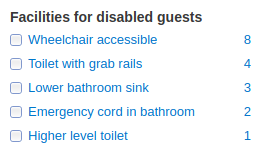It has been a while since I wrote something. This is normally a good trigger for a random thoughts post.
As much as I like writing, and really love what Fred Wilson has been doing blogging daily for the past 10 years, I am recently questioning my ability to follow the same path. It is a hard to build habit. It has enormous benefits that I talked about earlier, but I don’t have the persistence to keep doing it daily. I also observed that there is a negative correlation between the number of posts I published, and how much is going on in life. I write more when I am at a sweet spot of interesting conversations, and free time. Which I am currently not at.
There is also the same negative correlation between how much I write and how much Arabic content I am exposed to. I recently unmuted everyone I muted on twitter, which included all my friends and one of my sisters (I muted anyone posting content I don’t like and would keep me in touch with what’s happening in Egypt). This made me exposed to a lot of Arabic content, which resulted in whenever I want to write, I expressed my thoughts as an Arabic tweetstorm.
I am always torn between writing in Arabic or English. In Arabic I know I can reach bigger audience, because not many people write on the same topics I do, and I think I have the ability to write what’s to the point. However, English has better long term benefits like improving my English, and career opportunities by people approaching me because they read something I wrote.
Work is so interesting these days. I never thought developer tooling can get this interesting. We launched new features on our platforms that allow our developers to operate at scale (I hope I have the time to publish some of this on the Zalando blog). We also screwed up a couple of times especially with changing stuff without communicating before. I discovered that some features you need to announce before releasing because it leads to confusion even if it provides better experience. And now it is getting more interesting as we are analyzing the tech stacks and thinking how easy it would be for a team to move to the Kubernetes infrastructure provided by my team. When you have a lot of data you can do lots of interesting stuff. Unfortunately this part of the post is a bit vague because I am afraid to break confidentiality, but the takeaway is it is getting more interesting for me. And BTW, I am hiring a product manager to join my team, come join me or refer someone you know.
I started learning German. After 20 months in Germany I finally signed up for my first German class. It is level A1.1 and I am a bit bored. I already know most of what’s being taught. A second problem I have in general with all language learning techniques I tried so far (Audio courses, Duelingo, Babbel, Rosetta stone, and classes) is the lack of gratification that would motivate me to continue learning the language. You have to invest a lot upfront before you are able to hold a meaningful conversation with someone, which leads to losing motivation in the middle and making language learning tedious. I am saying this and I am the extroverted butterfly who talks to every random person on the street. I can imagine it is far worse for people dealing with social anxiety. I don’t know the solution, but I think my next step will be a private tutor.
A random thoughts post can’t be without talking about books. I finished “The Subtle Art of Not Giving a Fuck”. I liked it. It was an easy read, and follows a stoic approach to life, which is quite similar to my and my father’s approach to life. It got boring a bit in the middle, and the author tried being deep at the end, but it didn’t have the desired impact on me. I couldn’t relate to death the way from the way he wrote about it. Overall it is a good light read.
I am currently switching between “The upside of stress” and “Skin in the Game”.
The upside of stress is by the same author of “The willpower instinct”. The book is about an interesting point of view towards stress. A more positive one. However, it can be summarized in 50 pages instead of the 200+. The book is full of personal anecdotes, and studies that seem far from having the argued impact. With psychology having a reproducability crisis, I wonder how much of it stays true over time.
Skin in the game is the second book I read by Nassim Talib after Antifragile. Nassim has this interesting way of stating the obvious in a convoluted way that makes it sounds too deep. I like reading him because he is a contrarian and normally has different ways to explain the same thing (Fat Tony, Greek mythology, history, modern day events…etc).
I am swamped these days between work, German, and my sister who is visiting me in Berlin. I like it.






